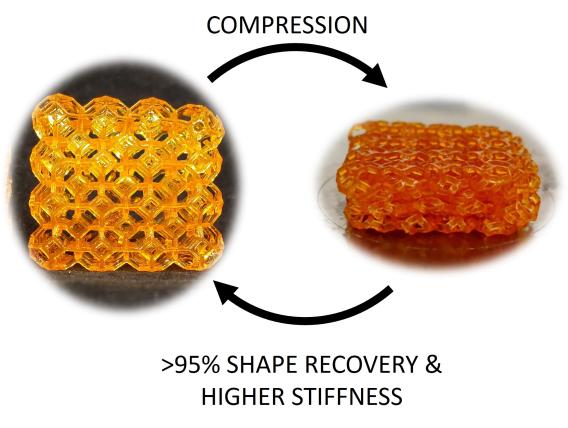Imagine a material that can be stretched and pulled out of shape that not only returns to its original shape but also grows stiffer and stronger each time. University of Washington researchers have developed a new “strain learning” metamaterial. Inspired by how nature strengthens materials—like how bones repair themselves or how spider silk becomes stronger when stressed—this innovation could significantly impact industries that rely on durable, adaptable materials, especially medicine. Their work, “Strain learning in protein-based mechanical metamaterials,” has been published in the Proceedings of the National Academy of Sciences of the United States of America (PNAS).
The team, led by chemistry professor and member of the Molecular Engineering and Sciences Institute (MolES) Alshakim Nelson and mechanical engineering professor and member of the Institute for Nano-Engineered Systems (NanoES) Lucas Meza, 3D printed protein-based polymers made out of polyethylene glycol (PEG) and bovine serum albumin (BSA). The researchers used a light-based 3D printer to create lattice-based mechanical metamaterials that unexpectedly became stronger and stiffer after testing.
“We were excited to see the stiffness was boosted up to 2.5 times based on the lattice architecture that we printed,” said Naroa Sadaba, a lead author on the publication and postdoctoral fellow in Nelson’s lab.
These materials were known to have a shape memory behavior – meaning they could recover their shape after being deformed – but the change in mechanical properties was a unique benefit.
“In natural materials like bone, cells can actively repair damage and reinforce the structure, but synthetic materials typically lack this ability,” said Meza, whose work examines how micro- and nanostructure can be used to improve material properties. “We usually design materials to sustain a particular load, hoping they won’t degrade over time. This new protein-based metamaterial allows us to create materials that strengthen over time based on the stresses they experience – sort of an analog to natural materials.”
Nelson’s lab’s work in sustainable, bio-based polymers was instrumental in developing the new strain-learning material. Using 3D printing, his lab can now create a wide range of complex shapes that strengthen under stress and are made from proteins. “The mechanical response of the proteins within the metamaterial networks serve an important role in the performance of these materials, and we are working to expand our understanding of how to use proteins to create other new materials,” said Nelson.
The work allows for designing autonomous, self-strengthening materials ideal for fields that demand high performance under mechanical stress. The team is now looking at medical device applications, where adaptable and biodegradable materials are critical.
View the press release first posted in Molecular Engineering & Sciences Institute news.
